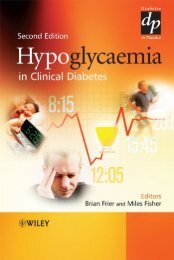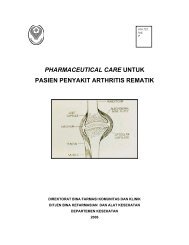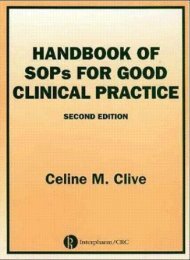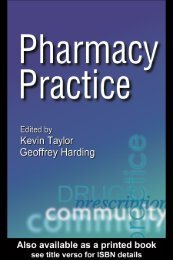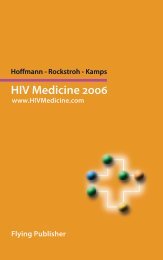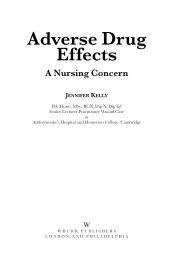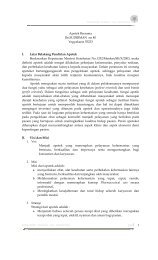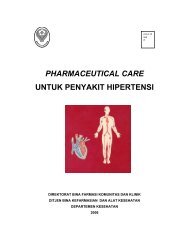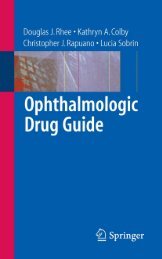- Page 1 and 2:
WOODHEAD PUBLISHING IN FOOD SCIENCE
- Page 3 and 4:
Related titles:Food dehydration: A
- Page 5:
Published by Woodhead Publishing Li
- Page 8 and 9:
first edition my main task was to r
- Page 10:
List of figuresThe protein amino ac
- Page 13 and 14:
2accelase A mixture of enzymes that
- Page 15 and 16:
4achylia Absence of a secretion; e.
- Page 17 and 18:
6acute phase proteins A variety of
- Page 19 and 20:
8adulteration The addition of subst
- Page 21 and 22:
10or benzoyl peroxide may be used t
- Page 23 and 24:
12broken onto a flat surface.As the
- Page 25 and 26:
14alexanders A herb, black lovage (
- Page 27 and 28:
16allergen A compound, commonly a p
- Page 29 and 30:
18cooking vessels and as foil for w
- Page 31 and 32:
20that protein (chemical score). Mo
- Page 33 and 34:
22THE PROTEIN AMINO ACIDS
- Page 35 and 36:
24amydon A traditional starchy mate
- Page 37 and 38:
26and causes pernicious anaemia. Di
- Page 39 and 40:
28anise, star A spice, the seeds of
- Page 41 and 42:
30gies) may be due to the productio
- Page 43 and 44:
32(E-210-213), propionates (E-280-2
- Page 45 and 46:
34sodium and magnesium carbonates,
- Page 47 and 48:
36arbute Fruit of the South Europea
- Page 49 and 50:
38arteriosclerosis Thickening and c
- Page 51 and 52:
40asparagine A non-essential amino
- Page 53 and 54:
42nervous system actions, include d
- Page 55 and 56:
44other amino acids.These linkages
- Page 57 and 58:
46shape: spherical (coccus); rodlik
- Page 59 and 60:
48Balade TM Low-cholesterol butter,
- Page 61 and 62:
50barbecue Originally native Americ
- Page 63 and 64:
52basic foods See acid foods.basic
- Page 65 and 66:
54bean, broad Also known as fava or
- Page 67 and 68:
56béchamel sauce Also known as whi
- Page 69 and 70:
58beet sugar See sugar; sugar beet.
- Page 71 and 72:
60beetroot) are red, betaxanthins y
- Page 73 and 74:
62bilirubin, biliverdin The bile pi
- Page 75 and 76:
64biotinidase See biocytin.Biotrace
- Page 77 and 78:
66remove excess salt from preserved
- Page 79 and 80:
68After a meal the concentration of
- Page 81 and 82:
70Bombay mix See chevda.bomb calori
- Page 83 and 84:
72ulinum. At least seven different
- Page 85 and 86:
74brawn Made from pig meat, particu
- Page 87 and 88:
76breakfast cereal (breakfast food)
- Page 89 and 90:
78brown fat See adipose tissue, bro
- Page 91 and 92:
80urges to overeat, followed by sel
- Page 93 and 94:
82butterbur See fuki.butterine US t
- Page 95 and 96:
84bones; the disease occurred in an
- Page 97 and 98:
86acid ingredient of baking powder
- Page 99 and 100:
88dose 10 3 organisms, onset 3-8 da
- Page 101 and 102:
90red blood cells into tissue space
- Page 103 and 104:
92carbohydrate by difference It is
- Page 105 and 106:
94carnauba wax A hard wax from the
- Page 107 and 108:
96carotenols Hydroxylated carotenoi
- Page 109 and 110:
98or maize 1 million. Introduced in
- Page 111 and 112:
100cayenne pepper See pepper, chill
- Page 113 and 114:
102celtuce Stem lettuce, Lactuca sa
- Page 115 and 116:
104southern France. It is reputed t
- Page 117 and 118:
106cheese, Schmierkäse and, in USA
- Page 119 and 120:
108chenopods Seeds of Chenopodium s
- Page 121 and 122:
110Se, Zn, vitamin B 2 ,B 6 ,a good
- Page 123 and 124:
112chining To sever the rib bones f
- Page 125 and 126:
114cholecystokinin (CCK) Peptide ho
- Page 127 and 128:
116loaf, which stales more slowly.
- Page 129 and 130:
118cieddu See milk, fermented.cigua
- Page 131 and 132:
120clabbered milk Unpasteurised mil
- Page 133 and 134:
122(2) A technique used to encapsul
- Page 135 and 136:
124cocoa, Dutch Cocoa treated with
- Page 137 and 138:
126coffee A beverage produced from
- Page 139 and 140:
128169 mg, Na 20 mg, Zn 0.1 mg, Mn
- Page 141 and 142:
130conalbumin One of the proteins o
- Page 143 and 144:
132cooling agents Compounds that re
- Page 145 and 146:
134corticoids (e.g. aldosterone) in
- Page 147 and 148:
136crawfish Crustaceans (without cl
- Page 149 and 150:
138Cambridge cream. Crème caramel
- Page 151 and 152:
140cryogenic freezing Freezing by u
- Page 153 and 154:
142custard Sweet sauce, traditional
- Page 155 and 156:
144cytochromes haem-containing prot
- Page 157 and 158:
146that can be reformed. Measuring
- Page 159 and 160:
148from either dehydration or freez
- Page 161 and 162:
150devils on horseback Bacon wrappe
- Page 163 and 164:
152diabetic foods Loose term for fo
- Page 165 and 166:
154formulated for people suffering
- Page 167 and 168:
156oxidative phosphorylation; was f
- Page 169 and 170:
158DNA Deoxyribonucleic acid, the g
- Page 171 and 172:
160drupe Botanical term for a flesh
- Page 173 and 174:
162coloured pulp, with a smell cons
- Page 175 and 176:
164Edifas TM cellulose derivatives:
- Page 177 and 178:
166thin white varies, depending on
- Page 179 and 180:
168elver Young eel, about 5 cm in l
- Page 181 and 182:
170from the end of the protein chai
- Page 183 and 184:
172en papillote French method of co
- Page 185 and 186:
174Many enzymes contain non-protein
- Page 187 and 188:
176equilibrium moisture content The
- Page 189 and 190:
178agent for agricultural chemicals
- Page 191 and 192:
180expeller A horizontal barrel, co
- Page 193 and 194:
182watercress on which the larval s
- Page 195 and 196:
184bonds (e.g. C18:2), followed by
- Page 197 and 198:
186fenelar Norwegian; leg of mutton
- Page 199 and 200:
188fibrinogen One of the proteins o
- Page 201 and 202:
190fish, fatty See fish, oily.fish
- Page 203 and 204:
192aromatic oils, and numerous plas
- Page 205 and 206:
194fleishig Jewish term for dishes
- Page 207 and 208: 196flummery Old English pudding mad
- Page 209 and 210: 198tube defects in babies; it is un
- Page 211 and 212: 200(2) toxic chemicals, either natu
- Page 213 and 214: 202The ice sublimes off as water va
- Page 215 and 216: 204frying Cooking foods with oil at
- Page 217 and 218: 206galacticol See dulcitol.Galactom
- Page 219 and 220: 208secrete insulin.Also known as gl
- Page 221 and 222: 210gelatine A soluble protein prepa
- Page 223 and 224: 212ghrt See ghee.giardiasis Intesti
- Page 225 and 226: 214gliadin A prolamin, one of the p
- Page 227 and 228: 216An alternative to part of glycol
- Page 229 and 230: 218gluten The protein complex in wh
- Page 231 and 232: 220glycosylation Chemical reaction
- Page 233 and 234: 222gossypol Yellow toxic pigment fo
- Page 235 and 236: 224fruit, or as a hybrid between po
- Page 237 and 238: 226chewing gum, a powder to be spri
- Page 239 and 240: 228Composition /100 g: water 79.9 g
- Page 241 and 242: 230even in the mature adult, and th
- Page 243 and 244: 232HarvestPlus International resear
- Page 245 and 246: 234into the oesophagus. A common fo
- Page 247 and 248: 236impaired) and complete abstinenc
- Page 249 and 250: 238Composition /100 g: (edible port
- Page 251 and 252: 240the 12th century ceremonial cutt
- Page 253 and 254: 242hontarako Japanese; salted and d
- Page 255 and 256: 244humidity, absolute (or specific)
- Page 257: 246permits determination of the con
- Page 261 and 262: 250idi Indian, Sri Lankan; steamed
- Page 263 and 264: 252induction period The lag period
- Page 265 and 266: 254so unavailable to micro-organism
- Page 267 and 268: 256iodopsin See rhodopsin.IoM Insti
- Page 269 and 270: 258sufficient blood to heart muscle
- Page 271 and 272: 260isopropyl citrate Ester of isopr
- Page 273 and 274: 262(2) Table jelly is a dessert mad
- Page 275 and 276: 264reagent (sulphur dioxide, pyridi
- Page 277 and 278: 266Keshan disease Cardiomyopathy th
- Page 279 and 280: 268sor of the croissant, believed t
- Page 281 and 282: 270konjac gum derived from tubers o
- Page 283 and 284: 272the flavour of fermented milk an
- Page 285 and 286: 274lamb’s wool Old English drink
- Page 287 and 288: 276Osmotic laxatives include magnes
- Page 289 and 290: 278Phaseolus vulgaris Navy, Boston,
- Page 291 and 292: 280levans Polymers of fructose (the
- Page 293 and 294: 282linoleic acid, conjugated Isomer
- Page 295 and 296: 284cron remnants, and cholesterol;
- Page 297 and 298: 286serving is a source of Ca, folat
- Page 299 and 300: 288made. US legislation sets precis
- Page 301 and 302: 290lymphocytes See leucocytes.lymph
- Page 303 and 304: 292chlorophyll and so in all green
- Page 305 and 306: 294maize starch, waxy starch obtain
- Page 307 and 308: 296Composition/100 g: (edible porti
- Page 309 and 310:
298marine biotoxins Toxins in shell
- Page 311 and 312:
300Matzka process A low-temperature
- Page 313 and 314:
302meat speciation Identification o
- Page 315 and 316:
304a means of identification, and a
- Page 317 and 318:
306metaphysis Growing portion of a
- Page 319 and 320:
308is oxidised to methyl pyridone c
- Page 321 and 322:
310migration In food packaging, the
- Page 323 and 324:
312partial evaporation; fat and tot
- Page 325 and 326:
3141.7mg, Cu 0.8mg, Mn 1.6mg, Se 2.
- Page 327 and 328:
316and A. sojae to form koji. Salt
- Page 329 and 330:
318moniliformin mycotoxin formed by
- Page 331 and 332:
320green Penicillium, black Aspergi
- Page 333 and 334:
322muscatels Made by drying the lar
- Page 335 and 336:
324mycotoxins Compounds produced by
- Page 337 and 338:
326729mg, Na 7mg, Zn 3mg, Cu 0.7mg,
- Page 339 and 340:
328neuritis Inflammatory disease of
- Page 341 and 342:
330nicotinamide adenine dinucleotid
- Page 343 and 344:
332nitrogen, metabolic Nitrogen in
- Page 345 and 346:
334NON-STARCH POLYSACCHARIDES
- Page 347 and 348:
336NSP See non-starch polysaccharid
- Page 349 and 350:
338intake, with a more severe restr
- Page 351 and 352:
340obstipation Extreme and persiste
- Page 353 and 354:
342oleic acid Mono-unsaturated fatt
- Page 355 and 356:
344onion Bulb of Allium cepa; many
- Page 357 and 358:
346organic (1) Chemically, the term
- Page 359 and 360:
348osteoclasts Cells that resorb ca
- Page 361 and 362:
350oxycalorimeter Instrument for me
- Page 363 and 364:
352palatone See maltol.Palestine be
- Page 365 and 366:
354Dietary deficiency is unknown; i
- Page 367 and 368:
356when the rice is polished, it co
- Page 369 and 370:
358with egg and milk. Spinach, toma
- Page 371 and 372:
360niacin 0.3 mg, B 6 0.02 mg, fola
- Page 373 and 374:
362acid. The intermediate compounds
- Page 375 and 376:
364pentagastrin Synthetic peptide t
- Page 377 and 378:
366remove amino acids sequentially
- Page 379 and 380:
3682.6 mg, B 1 0.03 mg, B 2 0.02 mg
- Page 381 and 382:
370Tyrosinase (monophenol oxidase,
- Page 383 and 384:
372saturated fatty acid. The third
- Page 385 and 386:
374rate. Calculated from the physic
- Page 387 and 388:
376pils Pale type of lager original
- Page 389 and 390:
378pizza Originally Italian; savour
- Page 391 and 392:
380polarimeter, polariscope Instrum
- Page 393 and 394:
382pomegranate The fruit of the sub
- Page 395 and 396:
384bottle. White port is made from
- Page 397 and 398:
386prahoc Cambodian; fermented fish
- Page 399 and 400:
388PRI Population reference intake
- Page 401 and 402:
390Pronutro TM Protein-rich baby fo
- Page 403 and 404:
392infection may be involved. The n
- Page 405 and 406:
394and human milk proteins, which a
- Page 407 and 408:
39615-20 °C, but they will grow in
- Page 409 and 410:
398PURINESLeuconostoc mesenteroides
- Page 411 and 412:
400centiles of expected mid-upper a
- Page 413 and 414:
40252% polyunsaturated),carbohydrat
- Page 415 and 416:
404Raftiline TM fat replacer made f
- Page 417 and 418:
406recombinant DNA Product of ligat
- Page 419 and 420:
408refractometer Instrument to meas
- Page 421 and 422:
410resistant starch See starch, res
- Page 423 and 424:
412rheopectic (rheopexic) A fluid w
- Page 425 and 426:
414native to eastern N.America, gro
- Page 427 and 428:
416roller mill Pairs of horizontal
- Page 429 and 430:
418acids, and whence the food is re
- Page 431 and 432:
420from a cereal, although it does
- Page 433 and 434:
422salsify (oyster plant, vegetable
- Page 435 and 436:
424Composition/100 g: (edible porti
- Page 437 and 438:
426evidence that the oil (which con
- Page 439 and 440:
428when fresh supplies of fruit and
- Page 441 and 442:
430sequestrene, sequestrol See edta
- Page 443 and 444:
432solera process, rather than by d
- Page 445 and 446:
434simnel cake Fruit cake with a la
- Page 447 and 448:
436H. pomatia composition/100 g: wa
- Page 449 and 450:
438somatotrophin, bovine (BST)A pep
- Page 451 and 452:
440vitamin B 1 0.44 mg, B 2 0.17 mg
- Page 453 and 454:
442spermyse Medieval English; soft
- Page 455 and 456:
444Spore-forming species, especiall
- Page 457 and 458:
446serving is a source of I, a good
- Page 459 and 460:
448Acid-modified starch (thin boili
- Page 461 and 462:
450indefinitely, since they are pro
- Page 463 and 464:
452yield desirable flavours in choc
- Page 465 and 466:
454testinal tract without being abs
- Page 467 and 468:
456sugar maple N. American tree; Ac
- Page 469 and 470:
458superoxide dismutase (SOD) coppe
- Page 471 and 472:
460provide bulk in the food. Includ
- Page 473 and 474:
462iso-syrups, high-fructose syrups
- Page 475 and 476:
464largely replaced by the NCHS (US
- Page 477 and 478:
466taste The tongue can distinguish
- Page 479 and 480:
468tender stretch process Process i
- Page 481 and 482:
470theobromine 3,7-Dimethylxanthine
- Page 483 and 484:
472thrombin Plasma protein involved
- Page 485 and 486:
474perature during storage, which m
- Page 487 and 488:
476ton refrigeration A measure of r
- Page 489 and 490:
478transferrin The main iron transp
- Page 491 and 492:
480trifluoracetyl chloride Used to
- Page 493 and 494:
482kynureninase (EC 3.7.1.3) is pyr
- Page 495 and 496:
484191 mg, Na 67 mg, Zn 0.3 mg, Cu
- Page 497 and 498:
486ugli citrus fruit; cross between
- Page 499 and 500:
488uric acid The end-product of pur
- Page 501 and 502:
490vasopressin Antidiuretic hormone
- Page 503 and 504:
492adhering to epithelial cells in
- Page 505 and 506:
494consumers that enhance physical
- Page 507 and 508:
496results in central nervous syste
- Page 509 and 510:
498dependent enzymes. The abnormali
- Page 511 and 512:
500synthesis of noradrenaline, and
- Page 513 and 514:
502VITAMIN Eactivity was equal to 1
- Page 515 and 516:
504essential). With the exception o
- Page 517 and 518:
506wari Indian, Pakistani; dried ba
- Page 519 and 520:
508water, Seltzer water or club sod
- Page 521 and 522:
510or embryo (rich in nutrients) 2%
- Page 523 and 524:
512WIN Weight-control Information N
- Page 525 and 526:
514state controlled Marque National
- Page 527 and 528:
516work See energy.wormseed See epa
- Page 529 and 530:
518Composition/100 g: (edible porti
- Page 531 and 532:
520ZAG Zinc α2 glycoprotein, secre
- Page 534:
Appendix
- Page 537 and 538:
526Table 2 Labelling reference valu
- Page 539 and 540:
528Table 4 EU population reference
- Page 541 and 542:
530Table 6 Recommended nutrient int
- Page 543 and 544:
532Table 7 (continued)E174E175E180S
- Page 545 and 546:
534Table 7 (continued)Plant gums (s
- Page 547 and 548:
536Table 7 (continued)Phosphoric ac
- Page 549 and 550:
538Table 7 (continued)Other compoun




